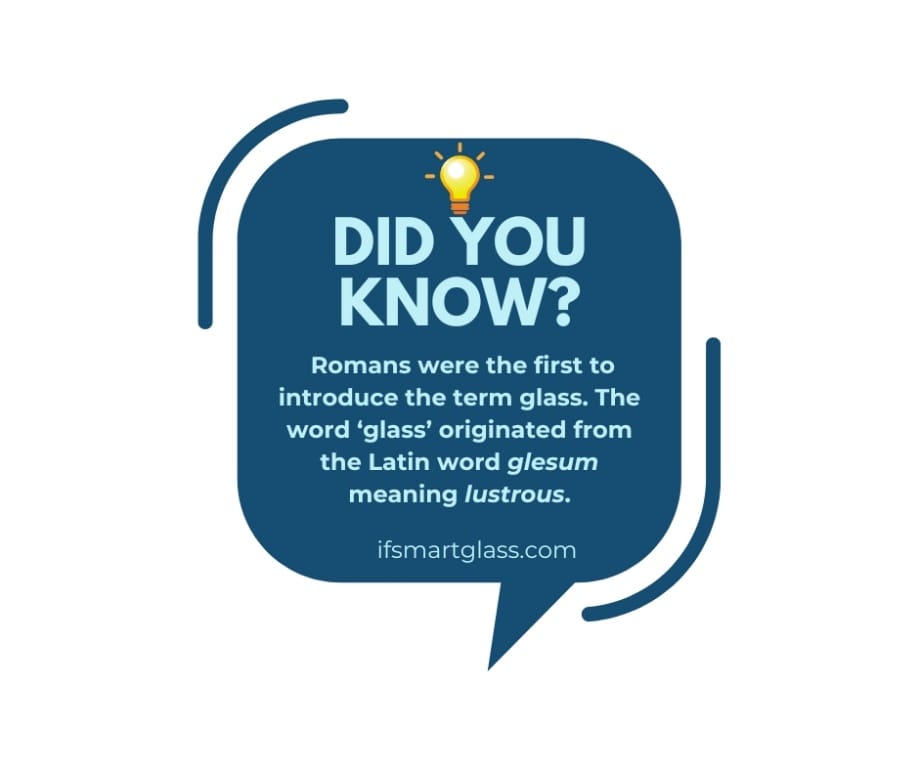Top Glass Manufacturing Company in Dubai
Imagine sitting by the window in your living room, holding your smartphone, and capturing the picturesque sight on your lawn, where little birds collect twigs and grass to build their home. Have you ever pondered that the mobile phone you are taking pictures with and the window you are looking through possess parallels in some ways? To your wonder, something ‘prosaic’ yet ‘valuable’ is known as glass.
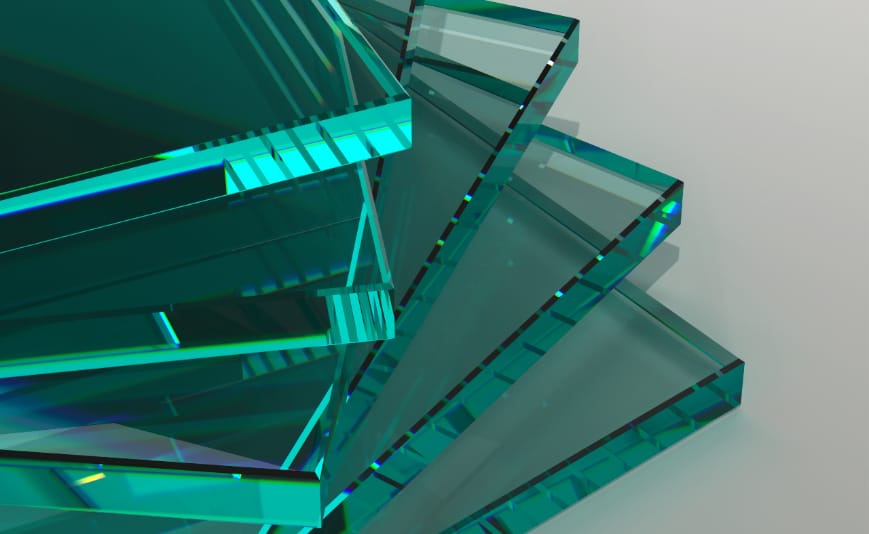
Glass Fundamentals and Characteristic Features
Glass, one of the most widely used amorphous (non-crystalline) solids, is an amalgamation of silica SiO2, soda ash Na2CO3, and limestone CaCO3, and is typically transparent. The fundamental properties and unmatched features make glass an integral part of our lives.
Some of the characteristics, that distinguish glass from other materials, are listed below:
⦁ Transparency Glass is transparent (sometimes translucent) in nature, allowing electromagnetic light to pass through it. Its ability to cause light rays to reflect or refract qualifies it to be used in lenses, mirrors, prisms, and other display screens.
⦁ Durability The heating process during glass manufacturing makes it hard enough to be used for longer periods.
⦁ Inertness Glass is immune to chemicals, i.e., it can withstand attack from reagents like water, which makes it an ideal fit to preserve liquids like juices, soft drinks, acids, etc.
⦁ Brittleness Contrary to plastic, glass is intrinsically brittle and tends to shatter under pressure. This is due to its specific molecular geometry, which makes it inelastic.
Glass Comes in Different Varieties
During the production process, glass can be molded into various forms by the addition of other ingredients like FeO and PbO. Once manufactured, glass can also be tempered or laminated to enhance its strength by either a thermal or chemical treatment. Glass is classified based on several criteria such as the nature of constituents, glass properties, strength, and constructional and architectural uses.
Concerning its composition, glass can be silicate, borosilicate, lead, phosphate, or aluminosilicate. Safety glass, insulating glass, fire-resistant glass, decorative glass, and soundproof glass are defined based on their properties. When it comes to its usage in construction, glass can be
How is glass manufactured?
You might wonder whether the glass exists naturally or is made through some artificial means. Apart from volcanic glass, which accounts for about 10% of the total, the rest is produced from the sand. Glass manufacturing initiates with the mixing of component elements; sand, soda ash, and limestone; which is placed in a furnace for thermal exposure. The molten mixture is homogenized and structured into the desired form afterward. The final step marks the glass cooling phase where it is passed through a specialized cooling oven called an annealing lehr. This step is done to make the glass tough and durable.
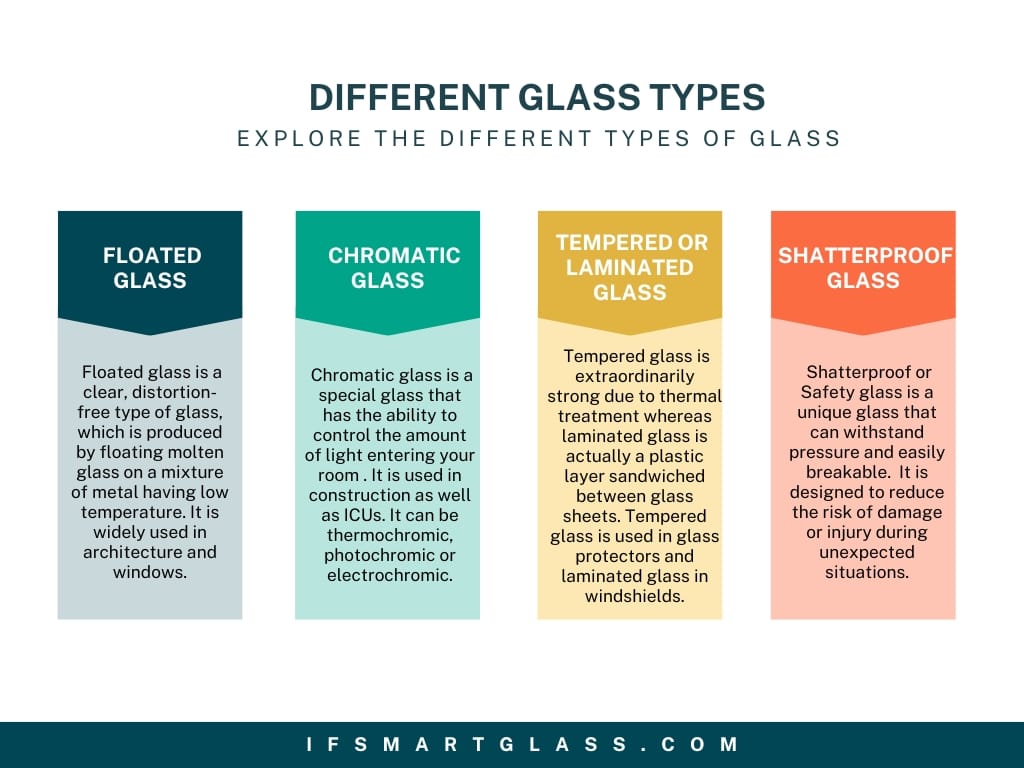
A Glance at The Global Glass Industry
Whether passing by the gigantic Burj Khalifa in Dubai or drinking your favorite juice in a goblet, you encounter glass everywhere. The glass economy worldwide witnessed a dynamic increase in production, sales, and trade in the past few years. This is because glass is an excellent alternative to plastic as it is more readily recycled and sustainable. Due to its eco-friendliness, glass is used worldwide for packaging purposes instead of plastic.
Glass is also a raw material for many commercial sectors like automobiles and electronics. Consider a car accident where the driver had a narrow escape due to a laminated glass windshield or imagine the enchanting features offered by the tiny chip in your smartphone, observe the architectural aesthetics in the buildings around you, or study the functioning of the optical fiber installed at your home; you’ll find that glass is a crucial element in all of these. It would not be an exaggeration to say that many areas of life remain incomplete without the intervention of glass.
The glass industry is estimated to have a global economy of about 150 billion US dollars. From the United States to China, England to Japan, and France to India; every major country in the world spends billions of funds on glass and glassware. Let’s have a look at the international glass market and understand who the major players in the game are.
China: Biggest Glass Exporter Worldwide
Statistics reveal that China was the biggest exporter of glass in the year 2022, followed by Germany. Other countries that shared the trade table were the United States, Japan, France, Italy, and Belgium.
Beijing Glass Group is one of the largest glass production units in China. Established in 1992, Beijing Glass Company caters to the sale of daily glass, industrial glass, quartz, and other silicate products.
United States: Biggest Glass Importer
The United States of America was the biggest importer of glass and glassware in 2021, followed by Germany. The United States itself contributes significantly to the global glass economy with its glass manufacturing industry known as Pittsburgh Plate Glass (PPG) Company. PPG was founded in 1883, and its headquarters are located in Pennsylvania.
Who is the Biggest Glass manufacturer in the World?
The world’s biggest name in glass manufacturing today is Saint-Gobain, which is headquartered in Paris. It was founded in 1665 and was famous for mirror production initially. It operates in 75 different countries today and has successfully generated sales of about 47 billion euros in the last year.
Let’s explore some of the major glass companies in the world, other than Saint-Gobain
AGC Group
AGC, also called Asahi Glass Co. Ltd., is a prominent Japanese glass-producing industry, that resides in the capital of Japan. Mitsubishi Group is the owner of this company, which has expertise in making ceramics, different chemicals, and top-notch glass. It was established in 1907 and is also ranked as the largest glass company in Asia.
NSG Group
Nippon Glass Sheet Co. Ltd is also a Japan-based Glass company, that came into being at the beginning of the twentieth century. Shigeki Mori is the CEO of NSG Group. This company owns more than half of the shares of Pilkington (A UK-based glass industry) and operates in 29 different countries of the world.
Corning Incorporated
If we talk about the glass industry of America, Corning Inc. tops the list. The company, founded by Amory Houghton in 1851, has its headquarters in New York. The specialty of Corning is Gorilla Glass, which is extraordinarily strengthened and impervious to damage. Corning succeeded in generating a considerable revenue of about 14 billion US dollars in 2022.
Vitro
Vitro, which originated 115 years ago in the land of Mexico, is a big name in the world’s glass economy. The company produces diverse glass and generates billions of dollars yearly. Adrian G. Sada Cueva is the CEO while Adrian G. Sada Gonzalez is the chairman of Vitro.
Guardian Service Industries
Located in the Auburn hills of Michigan is another US leading glass company called Guardian. It is a relatively small industry that specializes in manufacturing coated, insulated, laminated, and tempered glass. The company was established in 1932 and has approximately 18,000 employees.
Pilkington Glass
Pilkington is a UK-based glass-producing company, which is an affiliate of Japanese company NSG. It was founded in 1826 by William Pilkington. An astonishing achievement of Pilkington is the development of auto-cleaning float glass, that can catalyze organic dirt using the light from the Sun. This unique tendency of glass is referred to as Photocatalysis.
Cornwall Glass
Based in England, Cornwall Glass is the youngest company that was established in 1978. It is a family-driven glass business that has been producing glazing products for commercial and domestic purposes for the past 40 years. 37 million US dollars was their annual revenue for the year 2021.
Now, there is a slight contradiction about the world’s biggest glass makers. Some regard Beijing Glass Group as the biggest glass supplier while in other’s opinion, it’s the Saint-Gobain that tops the list. Anyhow, it is the annual revenue of the company that decides who is going to win.
Where is the Best Quality Glass produced in the World?
It is not that easy to say which country is famous for producing premium quality glass. After all, a number of factors determine whether the glass is worth it or not; such as the glass type, user’s needs, company reputation, customers’ feedback, and the company’s revenue. Therefore, at a specific time frame, any country can be regarded as the best quality glass producer.
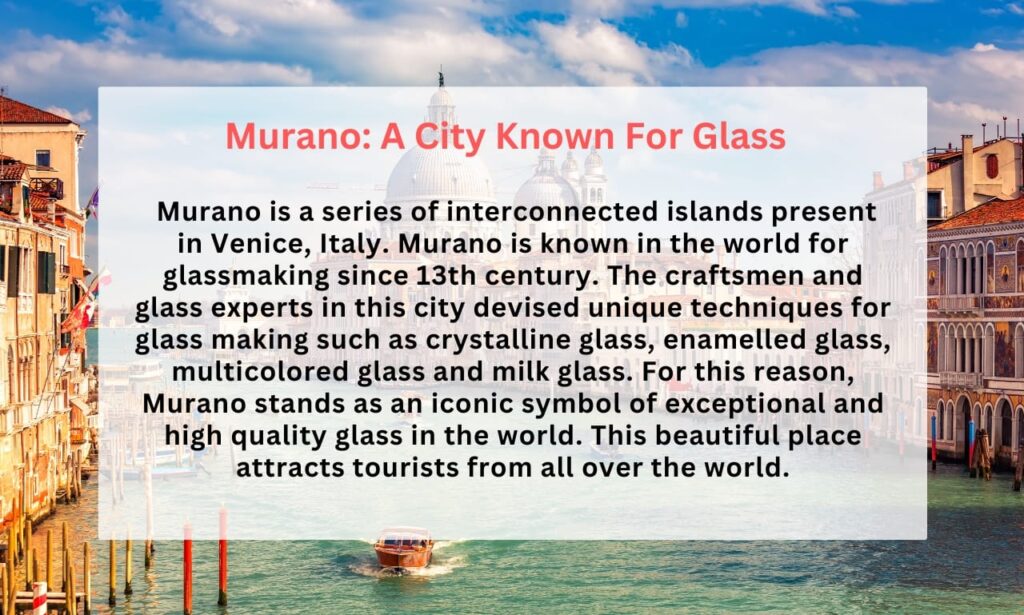
Dubai’s Glass Economy
Let’s narrow the spectrum and get specific about the glass market in Dubai. As a result of its smart planning and business-centric approach, Dubai pushed itself away from oil and established industries, fostering trade and tourism and becoming the most flourishing economy in the world. Dubai offers an excellent trade route due to its geopolitical position that links it with Asia on one side and Africa and Europe on the other. The easy access to quality raw materials, government support, and a sustainable business ecosystem make it an ideal place for the glass industry to boom.
Leading Glass Industries in Dubai.
To comprehend the glass economy in Dubai and its role in shaping the global market, we’ll look at some of the major glass industries. The most prominent ones include The Emirates, Timbergloss, Mirodec, Gulf Industries, Dubai Glass Industry and TGAC.
Located at the heart of industrial hub Al-Quoz, Emirates Glass is a top glass manufacturing unit in Dubai. The industry specializes in producing Fire-rated glass, ARMAX (an anti-reflective glass), switchable glass known as Smart Lite, and Bullet-resistant glass. It also manufactures solar control glass known as the Emicool Solite Series, that can withstand extreme temperatures and direct the right amount of sunlight to enter the rooms.
Emirates Glass, as part of Glass LLC, makes its place among the largest producers of flat glass in the Middle East. Mr. Rizwan is the executive president of Emirates Glass, which was founded in 2008. Whether it’s cutting or glazing, tempering, or lamination, you can expect anything from this recent addition to the international glass economy.
Innovative Future Smart Glass resides in the industrial sector of Dubai. It was started as a subsidiary by Mr. Shahzad in July 2022. PDLC Switchable Glass is the unique product of this company, whose customer-centric design cares for your comfort and privacy.
The company uses optical polymer to design premium quality glass film that exhibits transparency up to 92% and blocks 99% of UV radiation. Innovative Smart Glass works with a motto of making your life easy by integrating technology.
Technical Glass and Aluminum Company (TGAC) began in 1989 as another leading glass company in Dubai. Over the past years, TGAC has developed into a major supplier of architectural glass in the vicinity of UAE. Recently, it established another facility in Al-Jebl, UAE with a total investment of 25 million US dollars
TGAC has been recognized globally by the top names in the glass processing field, such as Saint-Gobain, AGC, Pilkington, Guardian, and many others.
Gulf Glass Industries is another big name in the UAE glass manufacturing companies list. With its headquarters located in Sharjah, GGI works to provide the most reliable glass products to meet the demand.
The hallmark of this glass factory is that it provides a 30-day training to its employees after the recruitment in the areas of glass processing, glass finishing, sales, and marketing. With its branches in many Gulf countries, GGI stands as a major actor in the world’s glass market today.
Innovative Smart
Glass Features
How Does Smart Glass Improve Your Experience In Homes?
Smart glass renders instant privacy at the touch of a button while pouring in the natural light to illuminate your living settings. Visit your nearby store or explore our website to stay updated about the latest trends in smart glass.
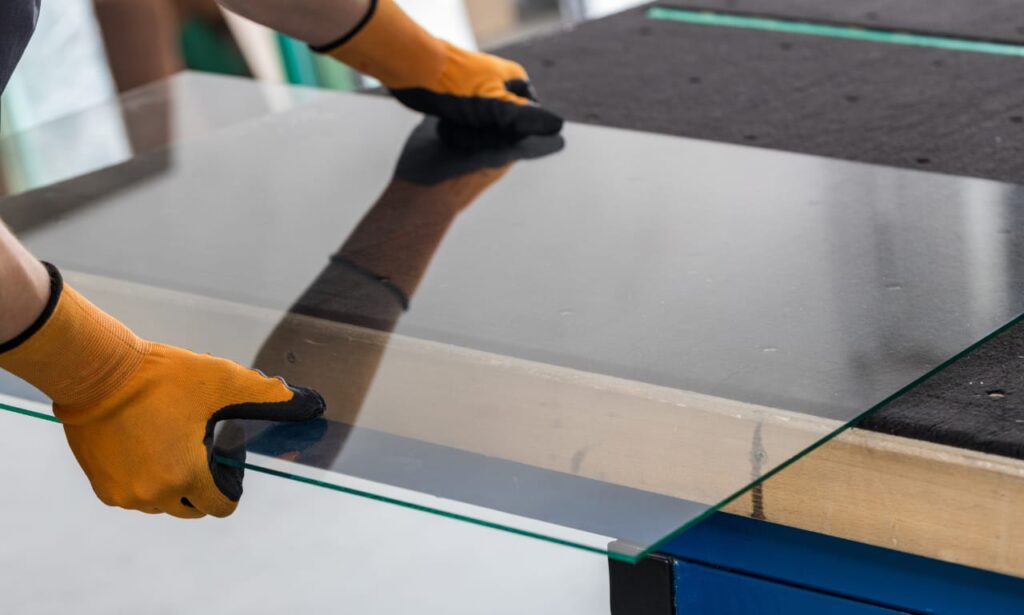
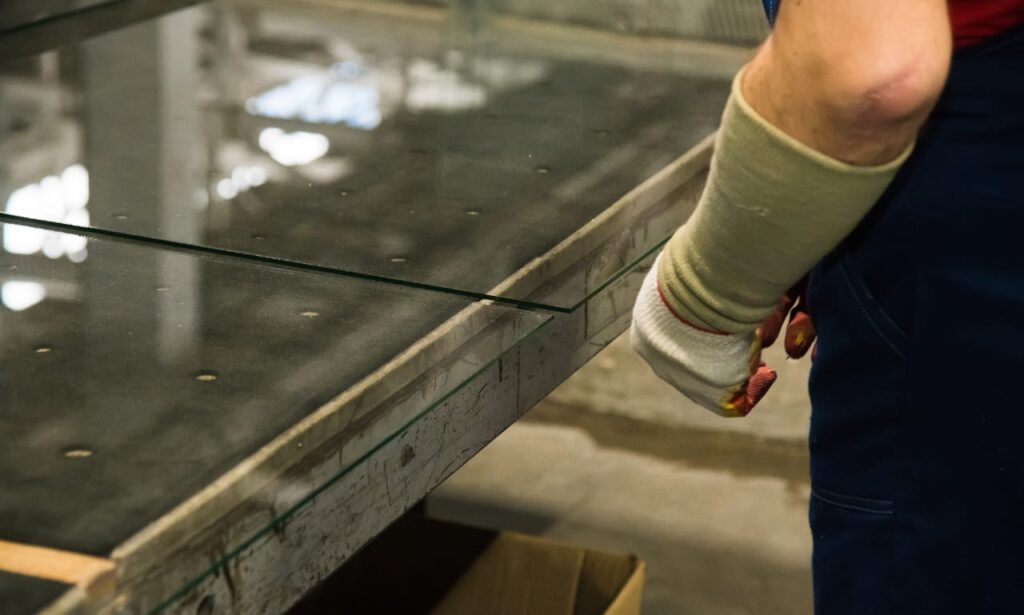
Is Glass Cheap or Expensive to Buy?
We can never neglect the cost factor whenever we are exploring the insights and dynamics of a particular product or service. Different parameters determine the cost of glass, such as the glass type, raw materials used, energy expenditure, production methods, etc. The price of the glass can also vary according to your geographical setting and the economic conditions there.
Tempered and laminated glass usually cost more than normal glass. Likewise, special variants, such as Smart glass, are way more expensive to purchase. Glass price is defined per square foot or square meter and changes with respect to the thickness. Therefore, we cannot have a final word about the standard cost of glass. For instance, a 4-12 mm tempered glass article can have a price of about 10 US dollars. Similarly, premium quality switchable glass can cost as much as 150-200 US dollars.
Hence, whether glass is cheap or expensive is defined by the interests and needs of the customer.
In essence, glass is a valuable product that has immense uses and there is nothing in this world that can replace it.
